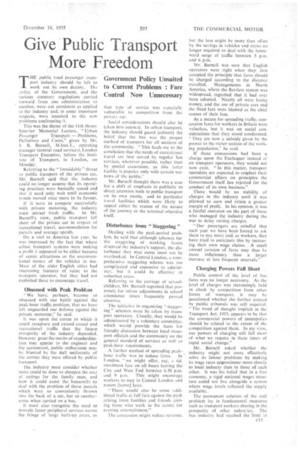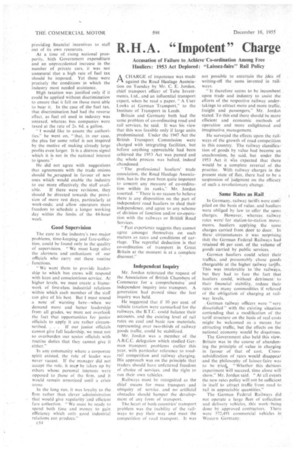Give Public Transport More Freedom
Page 53

Page 54

If you've noticed an error in this article please click here to report it so we can fix it.
Government Policy Unsuited to Current Problems : Fare Control Now Unnecessary
T
. HE public toad passenger trans port industry should be left to work out its own destiny. The policy of the Government, and the various statutory regulations : carried forward from one administration to another, were not consistent as applied to the industry and, in some important respects, were unsuited to the new problems confronting it.
This was the theme of the 11th Henry Spurrier Memorial Lecture, "Urban Passenger Transport — Problems, Palliatives and Cures," given by Mr. J. B. Burnell, M.Inst.T., operating manager (central road services). London Transport Executive, before the Institute of Transport, in London, on Monday.
Referring to the " formidable" threat to public transport of the private car, Mr. Burnell said that the industry could no longer assume that its operating practices were basically sound and that it need only wait until economic trends moved once more in its favour.
If it were to compete successfully with private motoring, the industry must attract fresh traffic. in Mr. Burnell's view, public transport 'fell short of the private car in respect of recreational travel, accommodation for parcels and average speeds. .
On a visit to America last year, he was impressed by the fact that where urban transport systems were making a profit it appeared to be either because of scenic attractions or the unconventional nature of the vehicles in use. Most of the older English cities had interesting features of value to the transport operator, but they had not exploited these to encourage travel. .
Obsessed with Peak Probkm
" We have, perhaps, become so obsessed with our battle against the peak-hour traffic problem, that we have left unguarded our defence against the private motorcar," he said.
It was upon the extent to which it could recapture and extend casual and recreational traffic that the future prosperity of the industry depended. However great the merits of standardization may appear. to the engineer and the accountant, public enthusiasm may h,-,-. blunted by the dull uniformity of the service they were offered by public transport.
'Me industry must consider whether 'more could be done to cheapen the cost of outings for the family man, and how it could. assist the housewife /to deal with the problem of those parcels which were so conveniently thrown into the back of a car, but so cumbersome when carried on a bus.
It must also recognize the need to provide faster peripheral services across the fringe of large built-up areas, as that type of service was especially vulnerable to competition from the private ear.
Social considerations should also be taken into account. In urban transport, the industry should guard jealously the belief that the bus was the proper method of transport for all sections of the community. "This leads me to the conclusion that the needs of recreational travel are best served by regular bats services, wherever possible, rather than by special excursions, as this latter facility is popular only with certain sections of the public."
• Mr. Burnell thought there was a case for a shift of emphasis in publicity to direct attention both to public transport on its own merits, and to particular travel facilities which were likely ta appeal either by reason of the nature of the journey or the terminal objective itself.
Disturbance from " Staggering " Dealing with the peak-period problem, he said that although schemes for the staggering of working hours deserved the industry's support, the disturbance they may cause must not be overlooked. In Central London, a comprehensive staggering scheme was too complicated and expensive to administer, hut it could be effective
in suburban areas.
Referring to the carriage of schoolchildren, Mr. Burnell regretted that proposals for inhor adjustments in school attendance times frequently proved abortive.
The initiative in organizing " staggering" schemes must be taken by transport operators. Usually, they would be administered by a voluntary committee, which would provide the basis for friendly discussion between local transport officials and the community on the general standard of services as well as 'peak-hoer requirements.
A further method of spreading peak
hour traffic was to reduce fares. in' 'London, "we might offer, say, a 6d. maximum fare on all buses leaving the City and West End. between 6.30 p.m.
and 9 p.m. This might encourage workers to stay iii Central London and return, [home] later.
There would also be sonic additional traffic at full fare against the peak arising from families and friends joining those who work in the centre for evening entertainment."
The concession might reduce revenue, but the loss might he more than offset by the savings in vehicles and crews no longer required to deal with the homeward surge of traffic between 5 p.m. and 6 p.m.
Mr. Burnell was sure that English operators were right when they first accepted the principle that fares should he charged -according to the distance travelled. Managementsin North America, where the flat-fare system was widespread, regretted that it had ever been adopted. Nearly all were losing money, and the use of private cars and the fixed fare were blamed as the chief causes of their loss.
As a means for spreading traffic, concession fares for workers in Britain were valueless, but it was on social considerations that they stood condemned. "They are now a subsidy given by the poorer to the richer section of the working population," he said.
If those concessions had been a charge upon the Exchequer instead of on transport operators, they would not now exist. "In this matter, transport. operators are expected to conduct their commercial affairs on principles the Government itself has rejected for the conduct of its own business."
There would be no stability of charges in the industry until it was allowed to earn and retain a greater margin of profit. In his opinion, it was a fateful omission on the part of those who managed the industry during the war to delay raising charges.
" Our passengers are mindful that each year we have been forced to ask them to pay more and, as workers, they have tried to anticipate this by increasing their own wage claims..„ A small annual revision of fares may thus he more . inflationary than a larger increase at less frequent intervals."
Charging Powers Fall Short • Public control of the level of bus fares was no longer necessary. As the level of charges was increasingly held in check by competition from other forms of transport, it may he questioned whether .the•further control by public tribunals was still required. "The trend of thought implicit in the 'Transport Act, 1953, appears to be that the commercial powers of monopolies should be related to the extent of the competition against them. In my view, our powers of charging still fall short of what we require in these times of rapid social change."
Mr. Burnell asked whether the industry might not more effectively solve its labour problems • by making its wage rates approximate more closely to local industry than to those of each other. It was his belief that in a free economy, a rigid national wages structure could not live alongside a system where wage levels reflected the supply available..
The permanent solution of the staff problem lay in fundamental measures such as transport workers sharing in the prosperity of other industries. The bus industry had reached the limit in providing financial incentives to staff out of its own resources.
At a time of rising national prosperity. high Government expenditure and an unprecedented increase in the number of private cars, it was not unnatural that a. high rate of fuel tax should be imposed. Yet those were precisely the conditions in which the industry most needed assistance.
High taxation was justified only if it could be applied without discrimination to ensure that it fell on those most able to bear it. In the case of the fuel tax. that discrimination had had the reverse effect, as fuel oil used in industry was untaxed, whereas bus companies were taxed at the rate of 2s. 6d. a gallon.
" I would like to assure the authorities," he went on, " that, in our case. the plea for some relief is not inspired by the motive of making already large profits even larger. It is a distress signal which it is not in the national interest to ignore."
He did not agree with suggestions that agreements with the trade unions should be,scrapped in favour of new ones which would enable the industry to use more effectively the staff avail able, If there were revisions, they should be directed towards the provision of more rest days, particularly at week-ends: and allow operators more freedom to schedule a longer working day within the limits of the 44-hour. week.
, Good Supervision
The cure to the industry's two major problems, time-keeping and fare-collection, could be found only in the quality of supervision. " We must keep alive the alertness and enthusiasm of our officials Who carry out these routine functions.
"We want them to provide leadership to which bus crews will respond with keen and conscientious service. At higher levels, we must create a framework of first-class industrial relations within which each member of the staff can give of his best, But l must sound a note of warning here—when we demand more and better leadership from all grades, we must not overlook the fact that opportunities for junior officials to apply it are rather circum scribed. . . If our junior officials cannot give full leadership, we must not so overburden our senior officials with routine duties that they cannot give it either."
In any community where a corporate spirit existed, the role of leader was never vacant. If the manager did not accept the role. it mar be taken up by others whose personal interests were opposed to those of the firm. and it would remain unnoticed until a crisis arose.
In the long run, it was loyalty to the firm rather than clever 'administration that would give regularity "arid efficient fare collection. " We must be ready to spend both time and money to gain efficiency which only good industrial relations can produce."
c14
















































































































